This is a simple EMG Controller for a bionic hand prosthesis
Dependencies: mbed-dsp mbed NOKIA_5110
Galileo Bionic Hand - ST Nucleo Example

This is an example of a simple hybrid sEMG(surface Electromyography) activated controller for the Galileo Bionic Hand Prosthesis implemented with the Galileo EMG Shield. The user has to select the desired posture by sending a special character through serial port (115200 baud rate) and then perform it through sEMG activation by detecting contraction on flexor muscles of the forearm. Contractions on forearm extensor muscles releases the posture and allows the return to the default or rest posture.
Special characters:
- '1', for "Power Grip" selection
- '2', for "Point" selection
- '3', for "Pinch Grip" selection
- '4', for "Lateral Grip" selection
- '5' for "Tripod Grip" selection

Galileo EMG Shield - 3 Channels for surface EMG
The electrodes for sEMG are placed on the skin surface and are connected to the input of a precision instrumentation differential amplifier based on Texas Instruments (TI) INA122, then its output is passed through an active low pass filter (LPF) based on TI OPA335 in order to sense the action bio-potentials of the muscular fibers with an output signal span in the range of 0 to 3.3V and a bandwidth between 0 to 500 Hz. The circuit is built-in on a custom PCB with 3 sEMG channels and a bias voltage reference output (1.25 V); furthermore, it is pin compatible with Arduino pin compatible ARM Cortex M4 boards and mbed platform ecosystem (ST Nucleo F411RE, Freescale FRDM K64F, NXP LPCXpresso 4337, ST Discovery F746NG, Renesas GR-Peach, etc), which is ideal for the single ended input of a microcontroller in addition to contributing to low cost development kits.
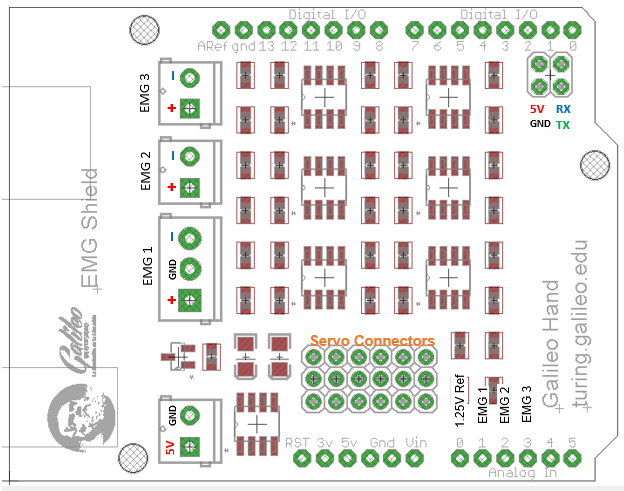

Electrodes Placement and Connection
Standard surface mounted Ag/AgCl electrodes with wet conductive gels are placed on palmaris longus and extensor digitorum muscles (third channel could be placed on Flexor carpi Ulnaris), focusing only on below elbow disarticulation. These electrodes have been well-characterized and most of its properties are well understood, except for some properties as drifting and low-frequency noise. Nevertheless, with proper preparation of the skin, the sEMG signal is excellent.
Disposable electrodes and snap leads information:
- http://bio-medical.com/products/din-ekgemgeeg-snap-leads-24-inch.html
- http://bio-medical.com/products/covidien-kendall-disposable-surface-emg-ecg-ekg-electrodes-1-24mm-50pkg.html
Proper placement of disposable electrodes for two channels of surface EMG is shown below:
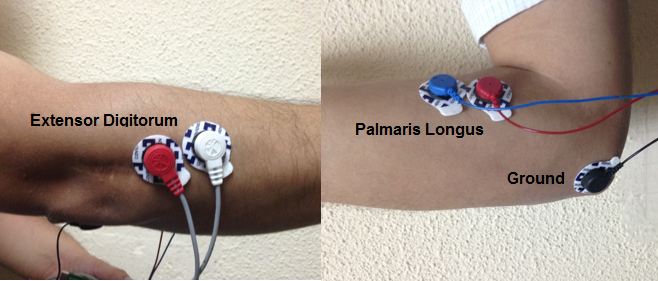
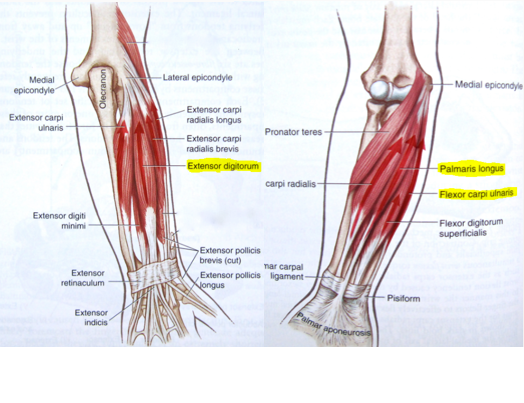
Customizable Postures
You can customize the actions by modifying PWM values (microseconds) on FingerPosition function (values depends on the way that the hand was built it). The prosthesis has five fingers and a thumb rotation mechanism and five actuators in order to perform multiple types of grasping. Wrist rotation will be implement later.
The servo motors have to be connected as shown below:
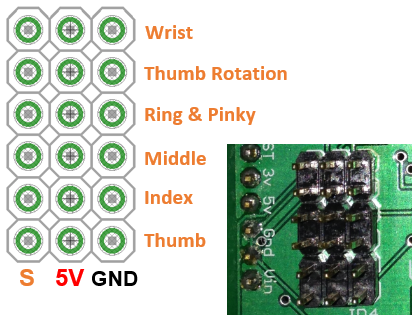
Function Declaration and Usage Examples
include the mbed library with this snippet
void FingerPosition(float32_t thumb_us, float32_t index_us, float32_t middle_us, float32_t pinky_us, float32_t thumbrot_us); FingerPosition(2400, 600, 600,2400,2400); //Close FingerPosition(2400,2400, 600,2400,2400); //Point FingerPosition(2400, 600,2400, 600,2400); //Pinch FingerPosition(2400, 600, 600,2400, 600); //Lateral FingerPosition(2400, 600, 600, 600,2400); //Tripod FingerPosition(1000,2400,2400, 600, 600); //Open
Serial Oscilloscope Feature
This feature easily allows to watch and log to file the data using serial oscilloscope software (115200 baud rate).
- Serial_Osciloscope(TRUE,RAW) to watch raw signals, FALSE deactivate this feature
- Serial_Osciloscope(TRUE,RECTIFIED) to watch rectified signals, FALSE deactivate this feature
- Serial_Osciloscope(TRUE,SMOOTH) to watch smooth signals, FALSE deactivate this feature
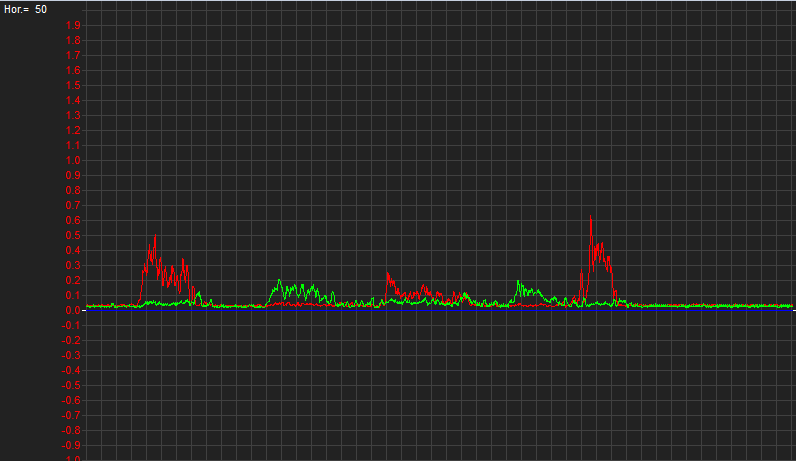
Universal Real-Time Software Oscilloscope GUI information: http://www.oscilloscope-lib.com/
Nolia 5110 LCD
Nokia 5110 display implementation for visual feedback will be add later, we have to modify libraries and fonts in order to improve the functionality. The main idea is to change of action by pressing a push button and change thresholds using a potentiometer.
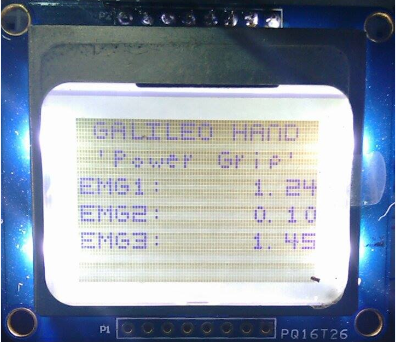
Information
Videos, bill of materials and tutorials to build the Galileo EMG Shield and the Galileo Bionic Hand will be posted soon, more information on:
- turing.galileo.edu/index.php/projects/galileo-hand
- http://bit.ly/arm_bionic_robo_hand
- http://bit.ly/galileo_hand_article
Diff: mbed-dsp.lib
- Revision:
- 6:78494092a326
- Parent:
- 0:f2b89c6a8a16
 Julio Fajardo
Julio Fajardo